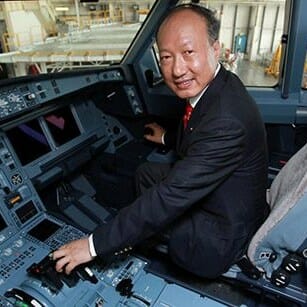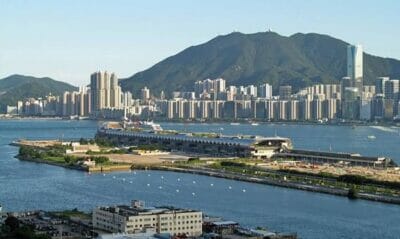
Is HNA Group chairman Chen Feng taking Hong Kong for a ride?
HNA may have shattered price records when it scooped up a series of residential sites in Kai Tak in recent months, but the mainland conglomerate says it’s all part of an effort to tame the city’s skyrocketing housing costs.
The founder and chairman of HNA Group, which owns China’s Hainan Airlines, went on a charm offensive in Hong Kong this week, saying the company was overpaying for land in order to break the power of the city’s dominant developers and ensure housing affordability.
In a rare media interview, HNA chairman Chen Feng said that “high home prices will affect Hong Kong’s competitiveness in attracting international talent, so the stranglehold should be broken.” The head of the Haikou-based firm, which has emerged in recent years as one of China’s most voracious overseas investors, also offered an explanation for the company’s aggressive bids on the Kai Tak sites: “We couldn’t have got into the market without paying above market prices.”
As if to prove HNA’s benevolence, Chen, who is known as “the Buddhist tycoon” for his professed faith and preference for traditional robes, said the company aimed to build and sell apartments for its employees at cost in its planned residential projects near Hong Kong’s former airport. “HNA will not make a single cent from the sale of these properties to staff,” Chen told the South China Morning Post, adding that through the project, HNA intended to help mitigate Hong Kong’s housing affordability crisis.
Record Land Buys Already Boosting Kai Tak Home Prices
While Chen professes a goal of Hong Kong housing affordability to date, the company’s aggressive acquisitions in Kai Tak have driven up home prices faster than 747s used to lift off from the landing strips of the former airport site.
In a series of four successful bids starting last November and ending this past March, HNA scooped up four adjoining land parcels in Kai Tak totalling 36,865 square metres (396,811 square feet), for a total price of HK$27 billion ($3.5 billion). This represents a price per square foot of HK$13,400, nearly double the amount paid in earlier land sales in the area.
According to research released by property consultancy JLL following HNA’s land buys, while Chen may have defeated local property developers in the quest for land, he seems to have lost the battle to ensure housing affordability, with home prices near HNA’s sites having risen by as much as 50 percent during the months since the transportation conglomerate began its acquisition streak.
In mid-March, just days before HNA’s fourth land acquisition was announced, fellow mainland investor Poly Property announced that it would be pricing units at its Vibe Centro in Kai Tak at HK$20,000 per square foot, outpacing earlier market expectations of around HK$10,000 per square foot.
This series of acquisitions in Tai Tak has helped push residential land prices higher in the city, with HNA’s third site purchase alone reported to be the main driver behind a 27 percent increase in the average land price between December and January.

The former Kai Tak airport area is being redeveloped around a cruise terminal and other infrastructure
HNA on a PR Push
In a recent interview with Hong Kong newspaper Sing Tao Daily, Chen made similar comments on the Kai Tak site, saying that the city’s residential market was dominated by a few large conglomerates that fuelled excessive prices. The report paraphrased the HNA boss as saying that “there must be certain costs involved to break the monopoly in the property market.”
Similarly, the South China Morning Post report summed up Chen’s view that his company’s record land bids “were motivated by a burning desire to snatch land and pricing power from the city’s real estate cartel.”
Meet the New Cartel, Same as the Old Cartel?
While a handful of large Hong Kong developers once dominated the local housing market, in the past few years, Sun Hung Kai, Cheung Kong and their competitors have had to make way for a set of deep-pocketed competitors from north of the border.
Mainland Chinese firms bought up 29 percent of new land sold for development in Hong Kong during 2015 and 2016, according to data from local brokerage Midland Realty, representing a sixfold increase over such activity in 2013-2014. The trend has intensified in 2017, with mainland companies having scooped up all of the six residential sites auctioned in the city for over HK$43 billion.
Aggressive land purchases are likely driving higher home prices in what is ranked as the least affordable housing market in the world. The latest Demographia International Housing Affordability Survey found that the city’s median house price was 18.1 times the median household income last year, topping the global list for the seventh year in a row. Home prices per square foot are reported to be nearly 90 percent above their 1997 peak.
Leave a Reply